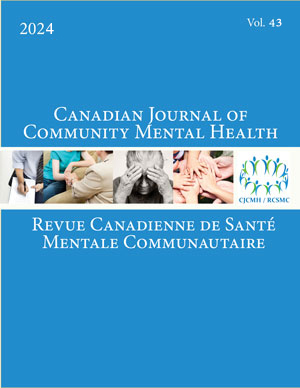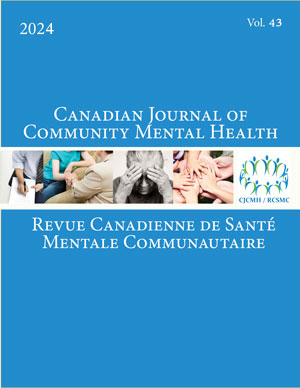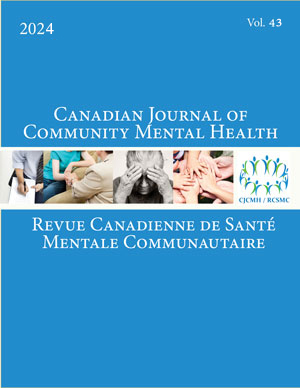Volume 23 • Number 2 • September 2004
OPEN ACCESS
This paper draws on experiences and research in mental health and international development to explore a dominant “World Mental Health” discourse. This kind of analysis provides a starting place to examine the critiques and ongoing theorizing of a global mental health ideology. Seeing the field as it is socially organized (Smith, 1987, 1990a, 1999) necessitates an understanding of how an ideological “World Mental Health” is discursively arranged as part of a global undertaking to decrease poverty and increase capitalist productivity and trade. Through this exploration of the discourses in use internationally, I argue that rediscovering local truth is possible as researchers pursue and share knowledge that has as its starting place a way of knowing outside these dominant discourses.
OPEN ACCESS
Drawing on research conducted in British Columbia, Ontario, and Quebec it is argued that tension exists between mental health reforms born out of concern for the well-being and care of people and those that are being driven by cost-containment and efficiency. Contributing to this tension are competing discourses about mental health and mental illness. It is argued that progressive change requires the meaningful engagement of mental health care recipients in policy decision-making processes and ongoing analysis about the interconnections between economic globalization, social welfare state restructuring and mental health reform.
OPEN ACCESS
The Swedish Mental Health Reform of 1995 was intended to expand community services, improve inter-organizational co-operation between welfare agencies, and achieve goals of social participation for the mentally ill and disabled. The implementation of the reform was characterized by weak legal steering mechanisms and a strong commitment to transform norms. Time-limited economic incentives at the local level and efforts by enthusiastic key persons were salient traits. The result indicates that community-based services such as supported housing and rehabilitative methods have increased. However, inter-organizational co-operation is still difficult, and traditional norms according to which people with mental health problems are seen as ill rather than disabled remain intact.
OPEN ACCESS
Trente péres d'enfants d'áge préscolaire vivant en milieu urbain défavorisé ont décrit comment ils conçoivent la santé mentale des enfants. Les entrevues ont été soumises à une analyse qualitative du contenu. Ces hommes présentent deux conceptions opposées, la première centrée sur l'insertion dans le milieu et la conformité aux normes, la seconde centrée sur l'expression de l'individualité et l'autonomie. Cette derniére conception est similaire aux définitions formelles proposées par les professionnelles et les professionnels, alors que l'autre y trouve peu d'écho. Un tel constat soulève d'importantes questions sur le manque de portée des messages de promotion du bien-étre des enfants auprès d'une portion non négligeable des personnes visées.
OPEN ACCESS
A major goal of community support programs is to help users of services lead meaningful, productive lives in the community. However, there is currently little evidence to support an understanding of how community support programs influence the productivity of service users, particularly from the perspective of consumers themselves. This qualitative study explored consumer perspectives on how community support programs promote productive activity. Data were obtained from in-depth interviews with a sample of 14 participants who received community support services, and analyzed using the constant comparative method involving unitizing, categorizing, and forming themes. The 4 themes that emerged from the data were: (a) the need for a specific focus on productivity within services, (b) the importance of consumer empowerment, (c) the need for learning opportunities, and (d) the value of supportive networks.
OPEN ACCESS
Cet article aborde la postvention à la suite d'un suicide en milieu scolaire secondaire. Il s'agit d'une analyse stratégique évaluant la pertinence d'un programme de postvention ainsi que le bien-fondé des interventions proposées et de la théorie sous-jacente. Dans cette optique, nous présentons la démarche menant à la rédaction du programme, sa description et la stratégie d'évaluation adoptée. Les résultats de l'analyse stratégique, découlant de l'évaluation du programme par 49 experts et expertes en suicidologie, révélent leur appréciation positive tout en suggérant certaines améliorations, notamment au niveau du rôle des intervenants et intervenantes, des facteurs ciblés pour amenuiser les effets du suicide et du rationnel justifiant l'application des mesures de postvention.
OPEN ACCESS
This study examines the relationships among maritally abused women's educational level, their satisfaction with social support, their children's perceived maternal support, and their children's global self-worth (GSW; Harter, 1985a). The participants, 38 pairs of maritally abused women and their children (aged 7 to 13 years), were recruited through women's shelters and community counselling facilities. The study found that children who have a sense of being emotionally supported by their mothers have a positive sense of self-worth. The hierarchical regression analyses show that children's perceived maternal support has a unique contribution to children's GSW above and beyond their mothers' educational level and mothers' satisfaction with social support (R2 = .31).
OPEN ACCESS
Stakeholders in rural and mid-size urban communities were asked to share their views concerning factors that affect the mental health of older adults, and indicate how, and how well, these factors were addressed in their community. The identified factors clustered into six categories: clinical, physical, organizational, educational, psychosocial, and spiritual. Additional factors impacting care providers and caregivers and their ability to support the mental health of older adults also emerged. Similarities and distinct differences between rural and urban communities were reported and call for innovative strategies to meet the needs of seniors, particularly those living in rural areas.










